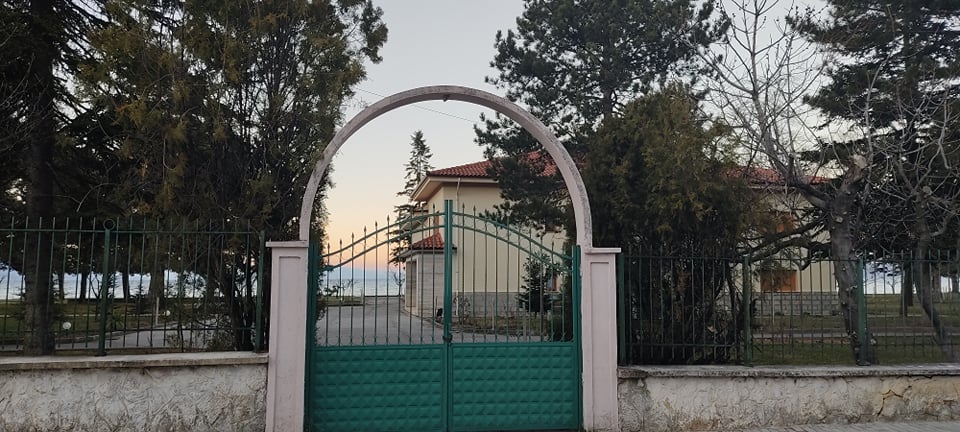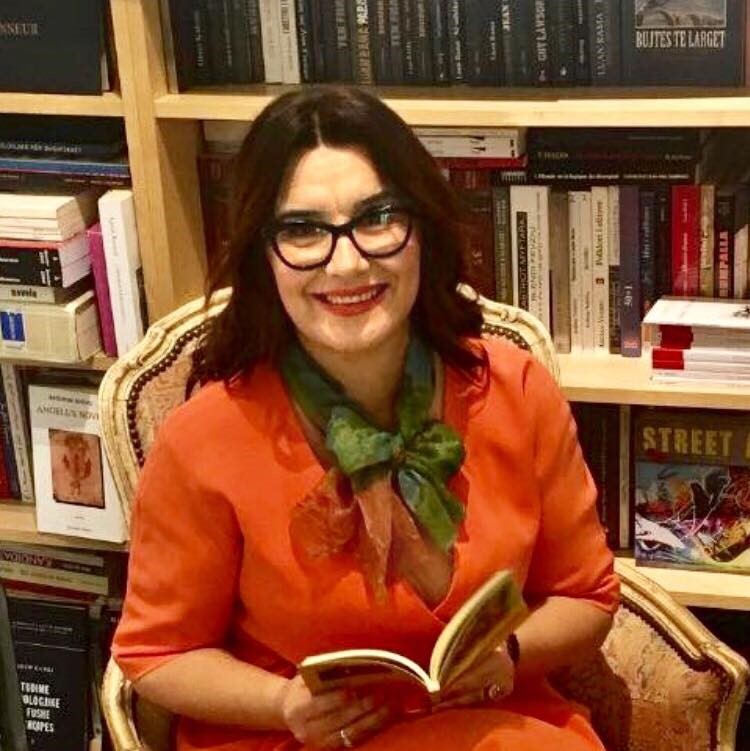Pronarët e ëndrrave dhe gardhi i hekurt i shtetit
Jam në vendlindje dhe po shëtis buzë liqenit. Pastaj devijoj në trotuar, sepse shëtitoren e pret si me thikë një gardh hekuri. Përgjatë gjithë fëmijërisë sime e derisa mbarova universitetit nuk kisha kaluar dot kurrë pas atij gardhit. Askush nuk mundej. Në kohën kur jetonte diktatori Enver Hoxha, ishte një tra, që ndante qytetin më dysh. Pas atij trau ndodheshin këto vila të bukura, ku udhëheqësit e shtetit socialist vinin e pushonin në verë. Kishin ndërtuar edhe këtu, si në Tiranë, një “Bllok” të tyrin, që i ndante nga populli. Askush nuk guxonte të shkelte aty. “Blloku” bënte dallimin mes njerëzve të zakonshëm dhe sundimtarëve. “Blloku” ishte dëshmia e qartë e grushtit të hekurt të diktaturës mbi popullin. “Blloku” ishte ndërtuar këtu në këtë qytet mbi tokat e grabitura me dhunë pronarëve të ligjshëm. Pa iu dhënë në këmbim asnjë gjë.
Pas rënies së Murit, atëherë kur ra diktatura në Shqipëri, ra edhe trau që ndante më dysh qytetin tim. Gati 30 vjet më parë im atë më mori me vete: Eja, – më tha. Dua të të tregoj tokën e të parëve. Im atë ëndërroi më kot, se më në fund prona do të kthehej tek i zoti. Pushtetin e diktaturës komuniste e zunë demokratët, të cilët premtuan se aleatët e tyre më të fortë në qeverisje do të ishin ish-të persekutuarit e regjimit komunist dhe, pa dyshim, ish-pronarët. Mashtruan. Ndërruan de jure vetëm ligjet. Por “Blloku” ngeli. Në atë kohë babai kishte moshën që kam unë sot. Tani është plakur shumë. Mbi 25 vjet u end me tapitë e vjetra të pronës së tij dhe dokumentet ligjore në duar derë më derë zyrtarësh të djathtë.
“Do t’u vijë radha së shpejti edhe ish-pronarëve, – i thoshin dhe e përcillnin. Pastaj shkonte me tapitë e vjetra të pronës së tij te pushtetarët e majtë, kur e merrnin këta pushtetin: Do t’u vijë radha së shpejti edhe ish-pronarëve, – i thoshin edhe këta, dhe e përcillnin.
Askush ende nuk ka parë se ç’ka pas atij gardhi hekuri. Ish-pronarët nuk u bënë në këtë vend kurrë pronarë, ata ngelën “isha”. Ishin të rinj, pastaj u plakën, u lodhën; ndokush edhe humbi jetën në luftën e tyre paqësore me zaptuesit e veshur me pushtet.
Më ço edhe një herë atje “te vilat”, më thotë im atë, ta shoh atë vend për herë të fundit. Këmbët mezi i hedh nga dhimbja dhe mosha. E ndihmoj të afrohet pranë gardhit. Sytë i ka të mbushur me lot. Ndërkohë na afrohet një ushtar i Gardës së Republikës dhe na thotë të largohemi, se po pushon Presidenti. Nuk ka president e ish-president, kryeministër e ish-kryeministër, që të mos jetë bërë edhe pronar rezidencash luksoze private në këtë vend të varfër, në toka jo të trashëguara.
Pas pak kohësh në Shqipëri janë zgjedhjet. Sërish do fillojë propaganda për zgjidhjen e çështjes së pronave mes shtetit dhe ish-pronarëve, të cilët tani o kanë vdekur, o janë me një këmbë në varr.
Kushtetuta e Shqipërisë më kot thotë se “E drejta e pronës private është e garantuar me ligj”. “Blloku” i ngritur nga diktatura për pushtetarët e saj është ende aty para syve tanë edhe sot, i njëjtë, si për të na kujtuar se demokracia dhe drejtësia që shpresuam para 30 vjetësh nuk duhej marrë seriozisht. Se seriozisht duhet marrë veçse frika e rikthimit të diktaturës në forma të sofistikuara, dhe ky gardh hekuri mes pronarëve dhe atyre, zaptuesve.
Die Eigentümer von Träumen und der eiserne Zaun des Staates
Ich gehe in meiner Geburtsstadt am See spazieren. Ich biege auf einen anderen Weg ab, weil die Promenade mit einem eisernen Zaun wie mit einem Messer durchschnitten ist. Ich konnte diesen Eisenzaun in meinem ganzen Leben bis zum Universitätsabschluss nicht passieren. Niemand konnte das. Zur Zeit des Diktators Enver Hoxha gab es hier eine Schranke, die die Stadt in zwei Teile trennte. Hinter der Schranke befanden sich die wunderschönen Villen, in denen sich die Führer des sozialistischen Staates im Sommer erholten. Sie hatten auch hier, genauso wie in Tirana, ihren „Block“ gebaut, der sie vom Volk trennte. Niemand wagte es, ihn zu betreten. Der „Block“ war das Unterscheidungsmerkmal zwischen den einfachen Leuten und den Herrschern. Der „Block“ war ein klarer Beweis für die eiserne Faust der Diktatur über das Volk. „Der Block“ wurde auf Grundstücken errichtet, die den rechtmäßigen Eigentümern gewaltsam entrissen wurden. Entschädigungslos.
Nach dem Mauerfall, als die Diktatur in Albanien fiel, fiel auch die eiserne Schranke, die meine Stadt zweigeteilt hatte. Damals, vor fast 30 Jahren, nahm mich mein Vater mit: „Komm“, sagte er zu mir, „ich möchte dir am See das Grundstück unserer Vorfahren zeigen.“ Mein Vater träumte von einer baldigen Rückgabe des Eigentums. Die Macht der kommunistischen Diktatur ging an die Demokraten über, die versprachen, dass die stärksten Verbündeten ihrer Regierung die ehemaligen Verfolgten des kommunistischen Regimes und, selbstverständlich, die ehemaligen Eigentümer sein werden. Sie hielten ihr Wort nicht. Die Gesetze wurden de jure geändert. Aber der „Block“ blieb. Zu der Zeit war mein Vater so alt wie ich heute. Jetzt ist er sehr alt. Über 25 Jahre lang ging er mit seinen alten Eigentumsnachweisen und den Gesetzestexten bei den konservativen Regierungsbeamten von Tür zu Tür.
„Bald kommen auch die ehemaligen Eigentümer an die Reihe“, vertrösteten sie ihn. Als die linken Politiker an die Macht kamen, ging er bei ihnen von Tür zu Tür. „Bald kommen die ehemaligen Eigentümer an die Reihe“, vertrösteten auch sie ihn.
Niemand hatte bisher gesehen, was sich hinter diesem Eisenzaun befindet. Die ehemaligen Eigentümer wurden in diesem Land nie Eigentümer, sie blieben „Ehemalige“. Sie waren jung, und sie wurden alt und müde und einige von ihnen kamen im langen friedlichen Kampf mit den Besatzern, die die Macht haben, sogar ums Leben.
„Bring mich bitte zu ‚den Villen‘, ich möchte sie noch ein letztes Mal sehen“, sagt mir mein Vater. Er kann seine Beine vor Schmerzen und Alter kaum noch gebrauchen. Ich helfe ihm, an den Zaun heranzukommen. Seine Augen sind voller Tränen. Währenddessen kommt ein Soldat auf uns zu und fordert uns zum Gehen auf, weil sich der Präsident ausruht. Es gibt nach der Wende in diesem armen Land keinen Präsidenten oder Ex-Präsidenten, keinen Ministerpräsidenten oder Ex-Ministerpräsidenten, der nicht Eigentümer großer und luxuriöser Privathäuser auf nicht ererbten Grundstücken geworden ist.
In einigen Tagen finden in Albanien Wahlen statt. Wieder beginnt die Propaganda über die Lösung des Eigentumsproblems zwischen dem Staat und den ehemaligen Eigentümern, die jetzt entweder bereits tot sind oder mit einem Fuß im Grab stehen.
In der Verfassung Albaniens heißt es vergeblich: „Das Recht auf Privateigentum wird gesetzlich garantiert.“ Der „Block“, den die Diktatur für ihre Machthaber errichtet hat, steht heute noch unverändert vor unseren Augen, als sollte er uns daran erinnern, dass die Demokratie und Gerechtigkeit, auf die wir vor 30 Jahren gehofft hatten, nicht ernst genommen wurden. Ernstgenommen werden sollen die Angst vor der Rückkehr der Diktatur in einer verfeinerten Form und der Eisenzaun der Besatzer, mit dem sie die Eigentümer außen vor halten.
Übersetzung: Zuzana Finger
Owners of dreams and the iron fence of the state
I’m in my hometown, walking along the lakeside. Then, I’m forced to turn onto the pavement because an iron fence slices through the footpath, like a knife. I never once passed beyond that fence, as I grew up or before I graduated from university. No one could. At the time when dictator, Enver Hoxha, was alive, a security barrier divided the city in two. Beyond it, were the elegant villas, home to the leaders of the socialist state in the summer months. Just as in Tirana, here they built their own special neighbourhood, called the “Blloku” in Albanian, which separated them from the people. No one dared trespass there. The “Blloku” distinguished the ordinary person from the ruler. The “Blloku” was clear evidence of the iron rule of the dictatorship over the population. The “Blloku” was built right here, in this town, on lands forcibly confiscated from the rightful owners. Without any compensation.
After the fall of the Berlin Wall, and when the dictatorship fell in Albania, so did that security barrier dividing my town. It’s now almost 30 years ago that my father said, “Come on, I want to show you our family’s land.” My father dreamed in vain that this property would be restored to its rightful owners, at long last.
The Democrats took over power from the Communist dictatorship. They promised that their strongest allies in government would be the former victims of the communist regime and, of course, the dispossessed. They deceived us. The laws changed de jure. But in practice, the “Blloku” remained. At that time, my father was the same age that I am today. Now, he is very old. Over 25 years ago, he wandered, knocking door-to-door, visiting right-wing politicians, holding the ancient title deeds and legal documents for his property, in his hands.
They all promised, “Don’t worry, we’ll deal with the dispossessed very soon,” and they escorted him out. Then when the left-wing politicians took over government, he went knocking door-to-door again, showing them his ancient title deeds, and they too promised: “Don’t worry, we’ll deal with the dispossessed very soon,” and they too escorted him out.
No one has yet seen what is behind that iron fence. The dispossessed have never managed to regain possession of their land, they remain the “former owners”. They were young, and then they grew old and tired; some even lost their lives in their peaceful struggle with these new occupiers, camouflaged in the mantle of government.
“Take me there once more, ‘to the villas’”, my father asks me, wanting to see that place for the last time. He can barely walk with the pain of old age. I help him get close to that iron fence. His eyes brim with tears. Meanwhile, a soldier of the Republican Guard approaches and tells us to move on, because the President is in residence. In this impoverished country, there is no president, or ex-president, prime minister, or ex-prime minister, who has not become the owner of a luxury private residence on land that is not theirs to inherit.
Soon, there will be elections in Albania. Once again, the propaganda will restart, about how the state will resolve the issue of the property confiscated from the dispossessed, the former-owners who are now either dead, or with one foot in the grave.
The Constitution of Albania states, in vain: “The right to private property is guaranteed by law”. Yet, the “Blloku”, established by the dictatorship for its elite, is still there today, right in front of our eyes, just the same, as if to remind us that the democracy and justice we hoped for 30 years ago can’t be taken seriously. That the only thing to take seriously is the fear of the dictatorship returning, in a more sophisticated form, with this iron fence, dividing the dispossessed from the occupiers.
Translation: Alexandra Channer
Teilen












